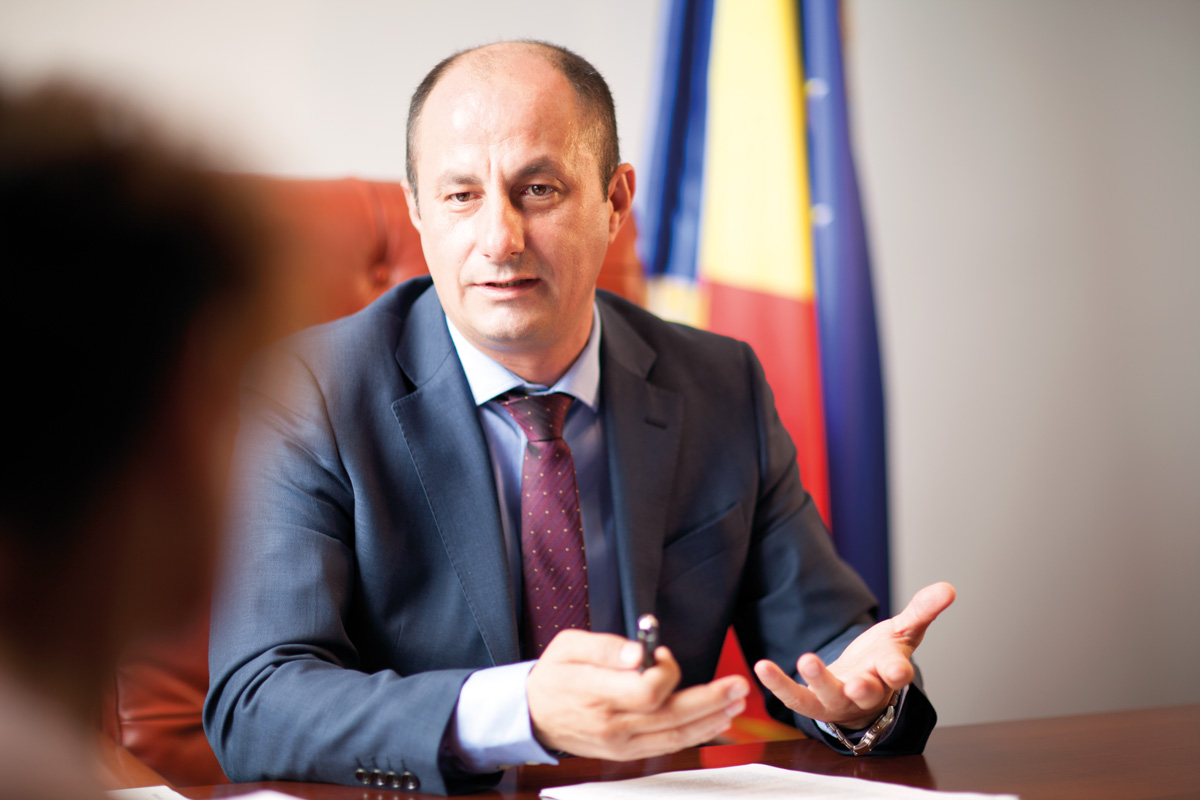Iulian-Robert Tudorache: Reconfiguring Romania’s energy priorities and integrating in the European energy market
Iulian-Robert Tudorache – State Secretary within the Ministry of Energy, coordinator of the oil and gas sector, has recently led Romania’s official delegation to the World Petroleum Congress held in Istanbul during July 9-13. Returned to Bucharest, he shared some personal thoughts and future plans on Romania’s part in implementing the energy reforms and in supporting the development of the European Energy Union.
Early 2017, you were appointed State Secretary within the Ministry of Energy, later you took over the duties of the minister for a short period of time, and currently you are coordinating the oil and gas sector. How did you gain experience in this area?
Although I am an attorney by profession, I can tell you that this is not my first experience with a ministry, I was adviser to Minister Andrei Gerea when he had the Energy portfolio and I have also worked in the past few years in some energy companies. So, it is a field close to my soul, in which I have gained experience with each passing year. It is true that I exercised the powers of Minister of Energy during the time when Minister Toma-Florin Petcu had health problems, which I am glad he has overcome, and I think I have succeeded, together with the entire Energy Ministry team, to meet all the challenges so far, which were not few.
Along with the challenges of world oil price fluctuations, one of the problems Romania is facing is the stagnation or postponement of projects and/or the continuation of investments, including in the oil and gas sector. What reforms are needed and how can this strategic sector of the national economy be stimulated and supported in terms of development?
The stagnation or postponement of investments in large-scale energy projects is not only Romania’s problem, it is a situation the entire world energy landscape is facing, and this is due first and foremost to the dramatic drop in oil barrel prices that forced the companies in this field to reconsider their development strategies and to be more cautious in launching the investments. The effect is also fully experienced in Romania too. Due to the persistence of low oil prices, the investments in the exploration and production sector need to be stimulated by a flexible mechanism to take into account the possible return of prices and the potential of each type of deposit. However, I believe that the substantiation of an investment decision must consider not only the commercial considerations, but also its strategic dimension and its contribution to ensuring national and regional energy security. The oil and gas sector needs to benefit from investments in modern equipment and technologies to increase the deposits’ recovery degree and to develop new deposits. If we do not deal with the resumption of investment in the exploration and production sector, as well as in the transport infrastructure, in order to capitalize on the potential hydrocarbon reserves and to put into practice the energy projects that we have proposed, Romania’s current low dependence on imports could change significantly in the future.
Talks have taken place more and more often lately, especially at high level, about ensuring a predictable and stable economic environment in order to attract foreign investments in our country. The companies in the energy industry have also repeatedly called for measures in this regard. How do things evolve on this issue and when do you believe the Energy Strategy of Romania 2016-2030 with the prospect for 2050 will come into force?
You are right, we are in the process of approval of the new Energy Strategy for 2016-2030, with the prospect for 2050, it is a document of utmost importance, with particular implications on the operations of the companies in the energy sector, on which the current Government wanted to bring its contribution. The strategy sets the directions for the development of the national energy sector for the next decades and provides to the public authorities and to investors the benchmarks needed in order to set the strategic decisions. The document is currently on the course of approval at the Environment Ministry.
The Energy Strategy envisaged a process of public consultation, observing the positions and the proposals put forward by all stakeholders. We want to ensure a regulatory and fiscal framework for a functioning and feasible energy market, in order to maintain the energy sector’s competitiveness, to attract and maintain capital and technology investments, to eliminate barriers to investment decisions, and the investment in projects that do not add value over long term, and to take into account all the parties involved: the state, the investors and the consumers. The document itself is extremely important for the future of the energy sector, but equally important will be our ability and determination to put this strategy into practice and the fact that it needs to be periodically revised and improved, depending on the developments in the energy landscape, at national and regional level.
Energy security is among the major objectives of the European Energy Union, to which Romania also subscribes. What are the levers and concrete activities by which the Energy Ministry contributes to achieve this goal?
We support the essential contribution of regional cooperation formats to increase energy security at regional and EU level in general and the positive impact that joint infrastructure projects can bring, as is the case of the Vertical Corridor. We are also actively involved in the efforts of the European Commission, both with regard to Joint Interest Projects and through the actions of the CESEC initiative, by assuming the implementation of strategic projects that will contribute to meeting the European Union’s energy objectives in regard to increased security of the energy sector at national and regional level.
If I were to talk only about a few lines of action – to develop projects that would ensure the diversification of supply sources, such as the BRHA project, to expand the bidirectional flow capacities of interconnections with the neighbouring countries, to upgrade the transport infrastructure and the storage capacities, which would ensure increased flexibility of the natural gas flow on the Romanian market, the development of new onshore and offshore, deep sea deposits, by exploiting the Black Sea resources, by increasing the recovery rate of the mature blocks, by developing modern technologies and increasing energy efficiency – are just a few of them.
Fortunately, Romania is one of the least dependent countries on gas imports. However, the main risk factor for the security of gas supply comes from a single supply source. Therefore, completing the interconnection of the national gas transmission system to those of the neighbouring countries and the integration of the Romanian gas market into the European market is the main factor for cutting down the risks related to the security of natural gas supply. At the same time, it is necessary to rethink the role of underground storage facilities, which were designed for seasonal use in order to cover the peak consumption, but the current situation is completely different against the one 30 years ago.
From the point of view of the hydrocarbon resources, the Black Sea basin – as a main pole of ensuring energy security in the area, but also as an essential element of the regional cooperation – gives Romania a key position. How does our country capitalize on these strengths?
We have a privileged position at the Black Sea and we have to capitalize on the potential of this production and distribution area, of strategic importance for energy security with significant hydrocarbon resources, therefore the development of the Black Sea resources is a priority for Romania, as well as attracting investments and collaboration with companies that have the know-how and the necessary technology. In recent years, several energy companies have announced discoveries in the Romanian Black Sea perimeter and are currently carrying out operations to verify the viability of the exploitation. The largest is announced by the Exxon-OMV Petrom consortium, but there are also other companies that have announced discoveries, such as Black Sea Oil and Gas, or Lukoil, alongside PanAtlantic and Romgaz.
Accessing the Black Sea’s energy potential can offer Romania a chance to diversify its natural gas supply. Therefore, the production of hydrocarbons in Black Sea waters can significantly contribute to increasing Romania’s energy security and can generate sustainable economic activity, as well as significant revenues to the state budget. Besides, there is an inter-ministerial team at Government level to provide the technical support needed to sustain the energy projects with development potential in the Romanian Black Sea region, and investors have a serious partner in the government team, which wants to provide stability and legislation predictability and a fair fiscal framework to ensure the convergence of the companies’ and Romanian State’s interests.
Recent developments point to a rebound of the interest in liquefied natural gas, and Europe has a chance to become a global hub and a major player in this market segment. What opportunities does Romania have in the near future in the LNG sector?
I believe that in the coming years the role of LNG as a major potential source of diversification will be maintained and strengthened. And because we are talking about the LNG sector, I have always supported the importance of the AGRI project, a unique Romanian initiative in the Black Sea region, having as partners Azerbaijan, Georgia and Hungary. It is a project with significant potential for increasing energy security in the region, which we are trying to bring to the investors’ attention and to support it in order to be included on the third list of Projects of Common Interest, which the European Commission is to complete this autumn.
For this project, we have a feasibility study completed in December 2014 with favourable conclusions for capacities ranging from 5 to 8 billion cubic meters, however the project’s shareholders have proposed to update it, considering the new regional energy context. We hope for a shareholders’ decision that would continue the developing of this project, given the support from Azerbaijan, the main supplier of the Southern Gas Corridor, but also from other Caspian and Middle East countries, with significant gas resources and for which this project can offer the opportunity of strategic option as potential gas suppliers for Europe.
The head of state said at the ‘Three Seas Initiative’ summit that if we want to have energy security, we need to have energy availability, i.e. we must take advantage of all the energy offers on the market. How does the Energy Ministry regard the new US offer of liquefied gas?
I believe we have a duty to learn from previous experiences and that of the Nabucco project is still present in our memory, a project in which Romania has invested considerably, which seemed to have all the strengths and the necessary support, was broke down in an unexplainable way for some energy analysts even today. If we have learned something from this experience, this is that we do not have to focus all our efforts and resources on a single project, on the contrary, we have the obligation to consider and analyse all opportunities that have the potential to contribute to the growth of energy security and to the diversification of energy supply sources and routes.
If, until recently, Europe was struggling to avoid the Russian gas dependence, seeking solutions against the GAZPROM monopoly, we are now witnessing a real ‘defence’ against the ‘invasion’ of American liquefied gas. However, there are countries in Europe that have already known to capitalize on this gas supply – like Poland, and I think Europe should regard it more wisely and consider that the US alternative to Russian gas could become a sustainable solution for the European gas demand if it offers attractive prices and efficient supply on the long-term.
Which are Romania’s most important partners in the energy field and which are the most relevant regional joint projects involving the Ministry of Energy during the coming period?
As part of its policy of openness towards co-operation with all states, Romania has trade relations in the energy sector, based on energy partnerships, with many countries. However, I think the most important thing is that these Partnerships do not remain at the stage of documents, we should capitalize on this privileged relationship with our partners through the relevant institutions and the people involved, and we have many relevant examples of success.
In terms of regional energy projects, as I coordinate the oil and gas sector, I will refer primarily to the projects in this sector. The Energy Ministry has contributed over time to the initiation and implementation of the concept of interconnection of Romania’s natural gas transmission system with those of the neighbouring states, as well as of other energy infrastructure projects, from the strategic perspective and the national and regional energy policy. The intention of the Romanian Government to promote and accelerate the necessary projects in the natural gas sector is also reflected by the promulgation of Law no. 185/2016 which addresses measures for the implementation of national interest projects in the natural gas sector, which are considered important for national security and safety. One of the most relevant regional strategic energy infrastructure projects, to which Romania is partner, is undoubtedly the BRHA project. I want to point out that both FGSZ and Transgaz have reiterated their commitment to continue their partnership to develop the bidirectional capacity at the Romanian-Hungarian border in the two stages of the project, which will ensure the transport of gas on the basis of BRHA corridor objectives.
You have recently led Romania’s delegation to one of the most important events of the year for the world oil and gas industry – the 22nd World Petroleum Congress, held in Istanbul during July 9-13. With what views and plans for the future have you returned?
Indeed, it was a special event that took place this year in Istanbul, and I also want to congratulate the hosts for the exceptional organization. The World Petroleum Council has 65 member-countries, representing more than 90% of the world’s largest producers and consumers, and Romania is one of the founding countries.
The Romanian delegation included representatives of CONPET and OIL TERMINAL. CONPET was present with a representative stand, which was also visited and appreciated at the exhibition organised on the WPC sidelines, with renowned oil and gas companies as participants. Besides the plenary sessions, round tables, ministerial sessions and workshops structured on topics of particular interest to the current energy landscape, we had the opportunity of extremely fruitful bilateral talks with delegates from the participating countries. However, I would be delighted if, at the next edition of the Congress, which will be held in 2020 in Houston, U.S., Romania will have a larger number of delegates and a larger presence of Romanian companies, including at the exhibition organised on the sidelines of the works. If we want to promote Romania as a regional energy power, we must show the world the huge potential we have in the energy sector, to capture and retain the investors’ attention and interest and to provide them the strategic reasons to come to invest in our country.
As a lawyer and energy specialist, what principles and priorities do you think should the government agenda include? What about your own one?
A reconfiguration of Romania’s energy priorities, an integration of the Romanian energy market in the European energy market and the recognition of Romania’s role in the regional energy equation. We want to make concrete and sure steps in coordinating the national strategies for the development and modernization of the internal energy transmission infrastructure with the regional transport corridors. From the perspective of operating the natural gas market and the development of competitive and integrated markets in the Central and South-Eastern Europe region under the CESEC initiative, my target is to continue to work closely with our neighbouring countries in order to develop strategic energy infrastructure projects to diversify sources, routes and energy suppliers.
Personally, I want to be a fair, involved and responsible business partner for all those who work in the energy sector and I don’t want to disappoint those who have trusted me when they have proposed me this position. We take pride with nearly 160 years of oil industry, being the country with one of the most important oil industries in Europe and a specialized education appreciated around the world. This valuable experience, the well-known Romanian specialists abroad, the potential of resources we have, give us the extraordinary chance to dispose of our energy future. The way the Romanian energy sector will look like over 10, 20 or 30 years depends on our ability and courage to make the necessary changes today.







